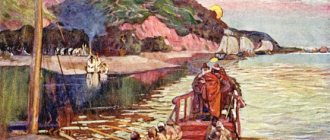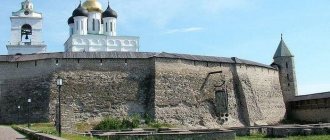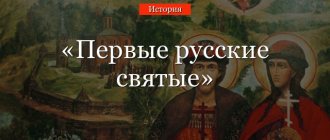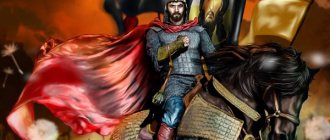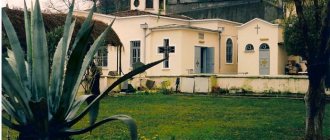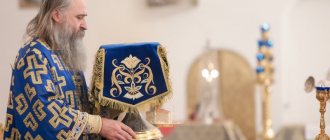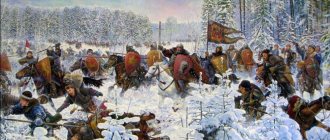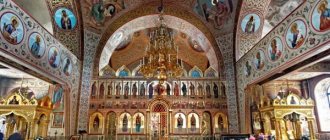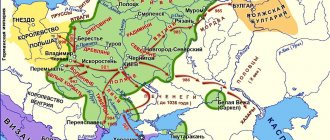Holy Blessed Prince Igor of Chernigov and Kyiv
The Christian feat of Prince Igor is akin to the feat for which the Russian Church canonized its first saints, Boris and Gleb. Like them, Igor refused to participate in the internecine struggle for the princely throne, entrusted his fate to God and was killed. Igor was the great-grandson of Grand Duke Yaroslav the Wise and the son of Oleg Svyatoslavich, who reigned in Chernigov and Novgorod-Seversky (a small town near Chernigov). Russian chroniclers nicknamed Prince Oleg “Gorislavich”: defending his rights to Chernigov, he did not hesitate to call upon the Polovtsians to help him, who thoroughly plundered the Russian land.
At one time, Igor also took part in the princely feuds. But he did not enjoy quarreling with his relatives over the inheritance of Yaroslav the Wise. When the opportunity presented itself to reconcile two warring relatives, he gladly took on this task.
In 1145, Igor's elder brother, the Kiev prince Vsevolod, appointed him as his heir. This angered representatives of another branch of the Yaroslavichs - the descendants of Vladimir Monomakh. As for the Kievites themselves, they swore allegiance to Igor when he promised them to stop the atrocities that were happening under the former prince. But a few days passed, and the people of Kiev became disillusioned with the new ruler. They didn’t like it when he forbade them to rob the yards of their recent offenders. And they secretly called the Pereyaslavl prince Izyaslav, one of the Monomashians. Igor came out to meet him with his squad, but the people of Kiev betrayed him and went over to Izyaslav. Igor hid in the swamps for several days, but he was found, sent to Pereyaslavl and imprisoned in a log house - a cold log house without windows or doors, from where the prisoner could be freed only with the help of an ax.
Igor's entire great reign lasted less than two weeks: he entered Kyiv on August 2, 1146, and was already overthrown on August 13.
Relatives tried to free him, but Igor did not at all strive to regain power. He asked Izyaslav to release him only in order to become a monk and devote the rest of his life to prayer. After his imprisonment, Igor was ill for a long time: he could neither eat, nor drink, nor move, so he did not pose any threat to the new prince. Nevertheless, he decided to keep him under supervision and assigned him to the nearest Kiev monastery of Theodore Stratelates, assigning a guard to be sure.
Civil strife in Rus'. Battle of Novgorodians with Suzdalians. Icon, mid-15th century
But even here Igor (in monasticism Ignatius, and then in the schema - George) did not find a peaceful life. Prince Izyaslav could not feel calm while he was alive. And so, on one of the September days of 1147, when Izyaslav was on a campaign, his ambassador arrived in Kiev and announced that Igor’s relatives, the Chernigov princes, had raised an uprising, and so that it did not spread to Kyiv, Igor needed to be destroyed as soon as possible.
An excited crowd burst into the temple, where the liturgy was just ending. They tore off Igor’s monastic vestments and began to beat him. All attempts to intercede on his behalf were in vain. The former prince was crippled and then dragged half-dead by his feet along the road. When the lifeless body was brought to the church, there, according to the Chernigov chronicle, all the candles lit up by themselves.
Local veneration of the schema prince began almost immediately after his death. Already in 1150, by order of his brother Svyatoslav Olgovich, a life was compiled, and the life of Saints Boris and Gleb served as a model for it. In a collection of sermons of the 15th century, Igor is already mentioned among the all-Russian saints.
Inheritance issue
Vsevolod Olgovich became the ruler of the Russian land as a result of a military coup (we wrote more about this in No. 42 of 2012). In 1139, after the death of Prince Yaropolk, the son of Vladimir Monomakh, power was to pass to his brother Vyacheslav. However, at that moment Vsevolod’s squad approached Kyiv, and he took the throne from the pretender by force. Vsevolod understood that his plans could be thwarted by other descendants of Monomakh, in particular his grandchildren - the children of Mstislav’s eldest son. After all, this squatting actually deprived them of their inheritance. Then Vsevolod hedged his bets and promised the eldest of the Mstislavichs, Izyaslav, that after his death he would transfer the Kiev throne not to one of his relatives, but to him. He believed - neither Izyaslav nor his brothers began to interfere with Vsevolod in seizing power. But during the years of his reign, the Kiev prince changed his mind. He no longer wanted to return power to the descendants of Monomakh. Once, during a feast, Vsevolod announced to the Russian princes: “I have decided that if death happens to me by God’s will, I will appoint my brother Igor to reign in the great reign.” Or I’ll give it to another eldest of the brethren. And you kiss the cross for me that you will keep this will of mine. Of course, this news outraged Izyaslav. “You previously promised to give me Kyiv after yourself, but now you’re giving it to someone else!” - he cried. “I promised you that at first,” agreed Vsevolod. “And you promised to honor me as a father and to be in my will.” But after, having come into agreement with your ranks (paternal uncles - editor's note), you fought against me and my brothers, for this reason you are not worthy.
Other saints and famous people named Igor
Igor Svyatoslavich (1151–1202)
The main character of “The Tale of Igor’s Campaign,” Prince Novgorod-Seversky and Chernigov, was the nephew of Saint Prince Igor and was named in his honor. Participated in many campaigns and battles. The plot of “The Tale of Igor’s Campaign” is based on the events that took place in 1185, when Prince Igor launched an unsuccessful campaign against the Polovtsians, was captured and fled three days later.
Igor Konstantinovich Romanov (1894–1918)
son of Grand Duke Konstantin Konstantinovich, great-grandson of Nicholas I. He was thrown by the Bolsheviks into a mine near Alapaevsk on the night of July 18, 1918, together with Grand Duchess Elizabeth Feodorovna and nun Varvara, glorified by the Russian Church as venerable martyrs.
Hierodeacon Igor (1879–1937)
(Ivan Mikhailovich Konashchuk)
For many years he was a novice in the Holy Dormition Kiev-Pechersk Lavra, and then in one of its monasteries - the Transfiguration Hermitage. Three years after the 1917 revolution, he became a monk and was ordained a hierodeacon. During the mass famine that gripped Ukraine in 1933, Father Igor began burying those who died of hunger: he himself, half-starved, drove along the roads with a handcart, collected bodies and buried them in the monastery cemetery. In October 1937, he was arrested and sentenced to death for “counter-revolutionary agitation.”
Igor Sikorsky (1889-1972)
Famous Russian aircraft designer, inventor, religious thinker. The creator of the Russian Knight aircraft (1913), the bomber and passenger aircraft Ilya Muromets (1914), which laid the foundation for multi-engine aviation. Developer of the world's first serial single-rotor helicopter (1942). After the revolution of 1917, he emigrated to France, then to the USA. He was an Orthodox Christian and wrote several religious and philosophical works.
Treason
Izyaslav was among the princes who promised Vsevolod not to interfere with the rule of his brother. And yet, after listening to the indignation of the people of Kiev about Igor’s dishonorable rule, the grandson of Monomakh decided to accept their invitation and quickly began to gather an army for the campaign. - Friends and brothers! - he turned to his army. “Although Vsevolod unjustly stole the throne after my death, I respected him, as the eldest in the family and my sister-in-law, instead of my father. And this Igor will in no way take away my father’s and grandfather’s heritage. Either I will fall gloriously before your eyes, or I will sit on the throne of my grandfather and parent! Having learned about Izyaslav’s campaign, Igor and Svyatoslav advanced with the army to meet them. They had no idea that most of their people had already betrayed them and supported Izyaslav, and their own commanders were secretly spying for the enemy. The betrayal was revealed just before the battle. Igor was amazed to see how most of his army suddenly went over to the enemy’s side. The Kiev prince nevertheless entered the battle, but his squad was quickly surrounded and scattered. Igor, realizing that he had suffered a crushing defeat, abandoned the army and fled, hoping to hide in the swamps near Kyiv. This is how the reign of Igor Olgovich, who ruled Russia for only 13 days, ended ingloriously.
Interesting Facts:
1.
Click to flip
2.
Click to flip
Lost power
The Pereyaslavl competitor immediately appeared, accompanied by a large army, and a battle took place near Kyiv on the shore of Lake Nadova between him and the squad of St. Igor. Izyaslav won, but he did not get it through military courage, but due to the fact that in the midst of the battle the Kiev army, consisting of townspeople deceived by the Grand Duke, abandoned their ruler and went over to his side. The victors celebrated their good fortune, according to the customs of that time, by plundering for several days everything that was on the lands that belonged to the enemy, including not only cities and towns (villages), but even holy monasteries.
Fury of the crowd
Meanwhile, in Kyiv, political passions, caused by the death of one great prince and the overthrow of another, did not subside, but flared up day by day. The reason for this was a harsh confrontation between supporters of Izyaslav, who usurped power, and representatives of the Olgovich family, to which the prince who became a monk belonged. Blinded by hatred, multiplied by exorbitant pride, neither side was willing to concede.
The conflict became especially acute after the people of Kiev learned that the Olgovichi - relatives of the Grand Duke they had overthrown - had hatched a conspiracy against Izyaslav in order to lure him into a trap and kill him. When this news was announced in the city square, it shook the entire people. The crowd could not deal with the culprits, since they managed to leave the city and gallop to Chernigov, where they safely took refuge behind the city walls. Therefore, general anger splashed out on the innocent Igor, who accepted the schema and atone for his own sins, and at the same time theirs, in the Feodorovsky Monastery.
Prince's Way of the Cross
This began the martyrdom of Saint Igor of Chernigov. The chronicle reports that for four days he hid in the marsh reeds, after which he was captured and taken to Kyiv. There, amid the hooting of the crowd, yesterday’s ruler, who had occupied the throne for no more than two weeks, was put in a “cut” - a wooden structure without doors or windows, so named because it was possible to remove a prisoner from it only by cutting a passage in the wall.
In his prison, Prince Igor became seriously ill, and the townspeople expected his death from day to day. In order not to take on sin and not leave his soul without repentance, they freed him from the cutting, since it was impossible to confess, and sent him to the Ioannovsky Monastery to be tonsured as a monk, which, as the chronicler emphasizes, was fully consistent with the desire of the prince himself.
Monastic tonsure
The troubles and humiliations he experienced produced a profound revolution in his soul. He began to rethink the past years and repent of all the iniquities he had committed. Under the weight of the sorrows that overwhelmed him, the prince felt the end of his spiritual strength and the approach of death, and therefore tearfully begged the abbot to quickly perform the rite of monastic tonsure on him.
At the beginning of January 1147, Bishop Euthymius of Pereyaslavl fulfilled his request. In monasticism, Prince Igor Olgovich was named Gabriel. For almost two weeks after performing the sacred rite, he was so weak that he could not speak, and was, as they say, between life and death.
However, contrary to everyone's expectations, yesterday's ruler did not die, but began to recover and after some time was able to endure long church services. When he was completely strong, he was transferred from the Ioannovsky Monastery to the Feodorovsky Monastery, where he soon accepted the schema - the highest level of Orthodox monasticism, this time with the name Ignatius. Completely devoted to ascetic deeds, Saint Igor spent his time in incessant prayers and fasts, asking the Lord for remission of his sins.
